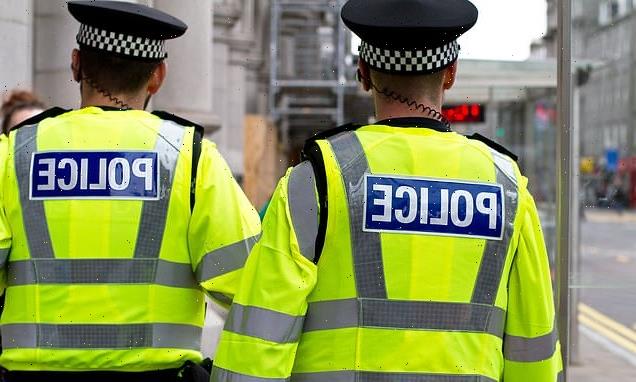Criminals are being let off… thanks to the pandemic: Officers are avoiding arrests and dropping cases, says watchdog
- New report to reveal some police forces avoided arresting criminals in pandemic
- HM Inspectorate of Constabulary and Fire & Rescue Services publishing report
- The watchdog will warn officers have been offering a partly ‘reduced service’
Police forces have avoided arresting criminals during the pandemic – writing off offences with ‘no further action’, a watchdog will reveal today.
In a damning report, HM Inspectorate of Constabulary and Fire & Rescue Services warns that officers have been offering a partly ‘reduced service’.
It says some crime reports have been dropped at the first opportunity due to coronavirus restrictions.
Police are now more likely than ever to close a case without even meeting victims, it says. The independent inspectors raise concerns about the ‘possibly detrimental effect’ on victims and suggest the changes risk further eroding public trust in the police.
Police forces have avoided arresting criminals during the pandemic – writing off offences with ‘no further action’, a watchdog will reveal today (stock image)
While catching criminals has been lowered in priority, officers have come under widespread criticism for issuing fines for Covid breaches, deploying drones over beauty spots and telling children not to play in front gardens.
Sir Charles Walker, a Tory backbencher, said: ‘We have asked the police to prioritise handing out Covid fines above most of their other duties and the consequences of this are a much-reduced service.
‘Confidence in law enforcement has been damaged and relations between the police and the communities they serve will need to be rebuilt.
‘Politicians have placed impossible demands on the police. These findings are replicated across large parts of the public services.’
Commissioned by Home Secretary Priti Patel, the report details examples of police abandoning ‘any outstanding investigations that could result in arrest’.
There are also examples of wanted criminals remaining on the loose because officers failed to chase up arrest warrants. In other cases, sex offenders living in the community received less supervision, potentially putting vulnerable victims at greater risk.
Covid-related changes saw some victims waiting two hours to report crimes by ‘web chat’ services, the report adds. And the watchdog reported a ‘growing trend’ of cases being closed when victims have never even seen an officer in person to discuss the crime.
‘These are examples of changes that could offer long-term benefits to police effectiveness and efficiency,’ says the 74-page inspection report entitled Policing in the Pandemic.
‘However, other changes resulted in a reduced service in some areas of police work.
Covid loan fraudsters are ‘unlikely’ to go to prison
Very few people will go to prison for fraudulently claiming Covid loan money because it is so hard to prove, MPs were told yesterday.
Andy Morrison, of HM Revenue and Customs, conceded only three people had been prosecuted for such fraud by last October. Covid finance schemes have been ripe for abuse, with fewer checks than usual due to the speed loans had to be agreed.
Ministers fear a significant percentage of the billions spent has been lost to fraud – some by organised criminal gangs. At the Commons Treasury committee yesterday Mr Morrison was asked if many people would end up in prison. He replied: ‘“Probably not” would be the answer to that. Fraud can be incredibly challenging to prove to that level.’
Gareth Davies, of the National Audit Office, told MPs the full scale of Covid loan fraud would emerge ‘gradually’. He said missing repayments on the bounce back loans next month will be the ‘first sign it might be a fraudulent claim’.
‘Routine requests for service were more likely to receive a remote response during the pandemic, rather than a police officer or member of staff attending. We found that responding without deployment was expanding into resolution without deployment.
‘A move to telephone resolution and desk-based resolutions was under way before the pandemic, and this increased.’
The inspectors urge police forces to examine carefully whether the pandemic has led to more victims refusing to co-operate with the criminal justice system and look at how officers can build a rapport with victims and witnesses. On police closing more crime reports, the watchdog says ‘some forces increased the number of crimes they decided not to investigate because they were unlikely to be solved’.
‘Any changes in decisions about whether to investigate offences with viable lines of inquiry or named suspects would be especially worrying.’
The pandemic saw more forces turn to online crime reporting rather than allowing crime victims to get in touch by telephone.
Martin Hewitt, chairman of the National Police Chiefs’ Council, said: ‘This report recognises that the past 12 months have been one of the biggest challenges to face modern policing, and that the service has stepped up and met that challenge head-on.
‘Policing has had to adopt new ways of working and adapt to both following and enforcing new legislation at speed. We haven’t always got things right straight away, and we have sought throughout the pandemic to learn as we go and improve the service we provide.
‘As lockdown eases and we start to look towards recovery, we will consider the recommendations from this report as part of this learning, working with our partners across Government, law enforcement and the criminal justice system.’
Source: Read Full Article

